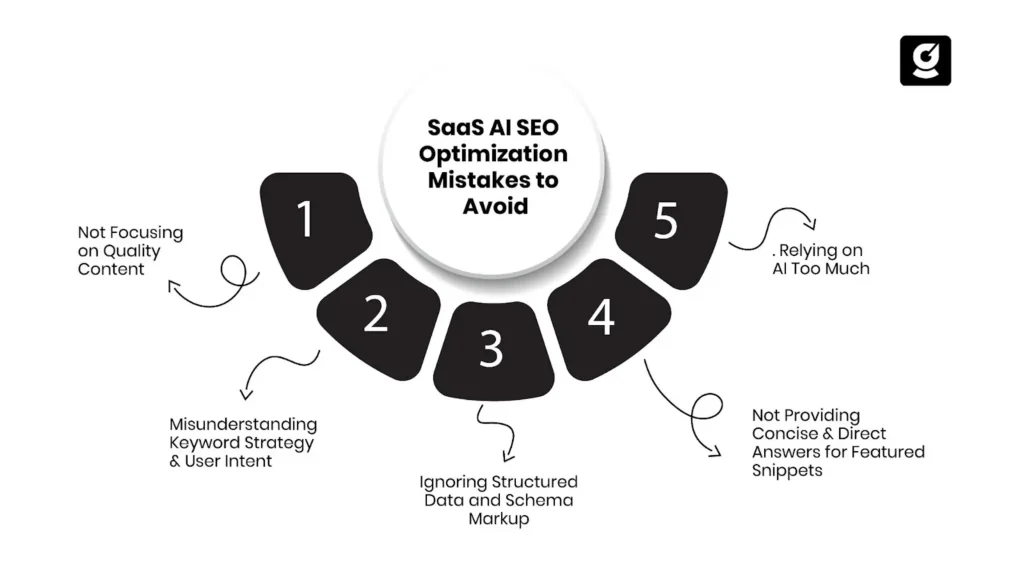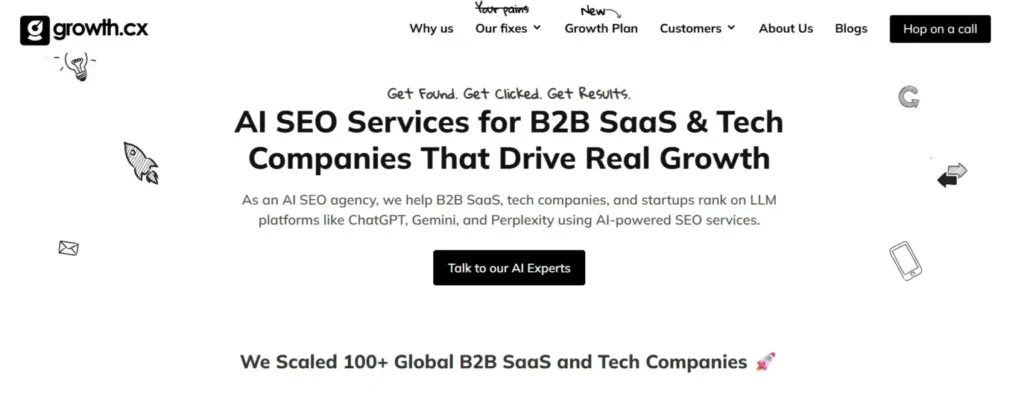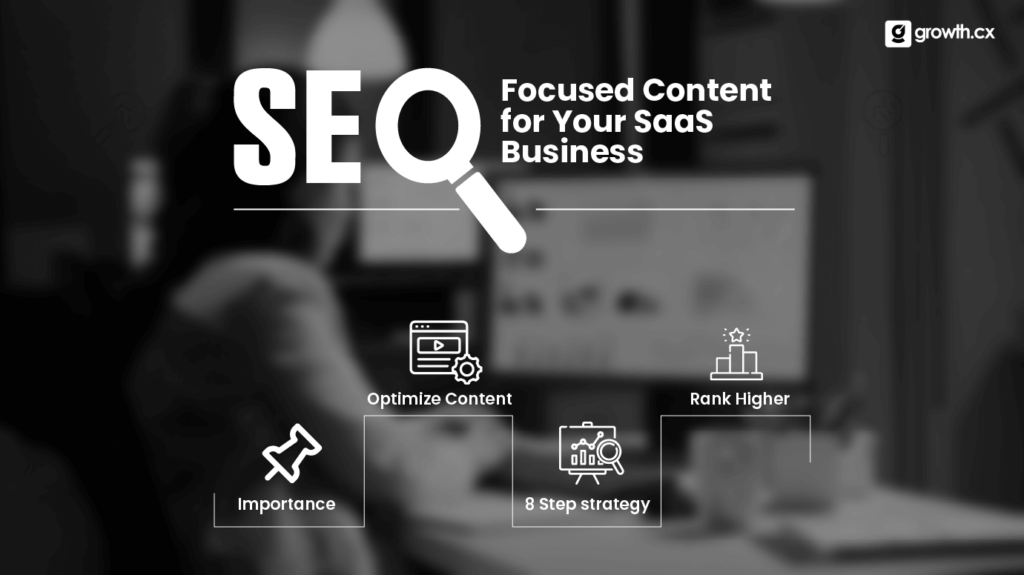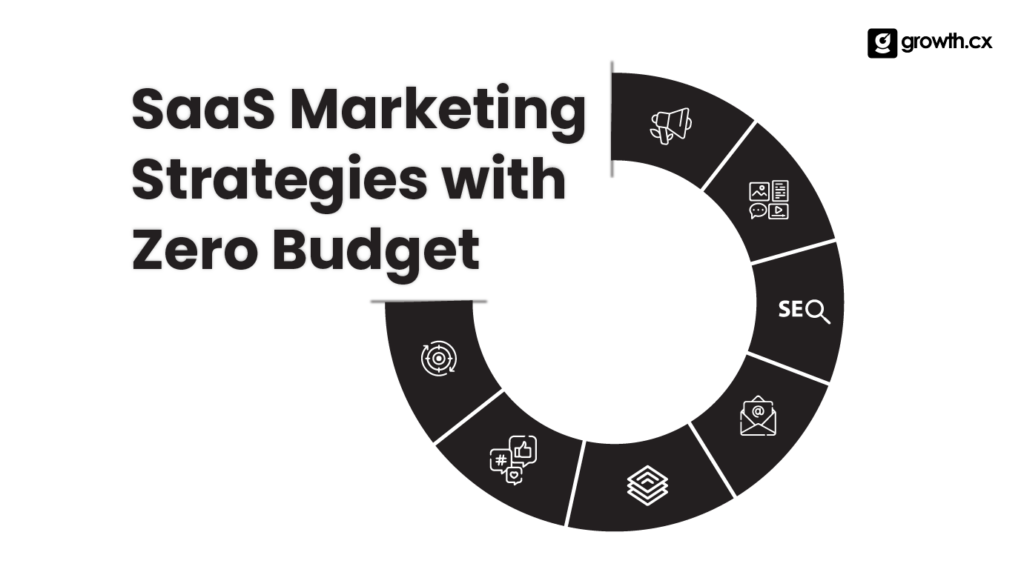Are you spending big bucks on marketing but remaining invisible where your buyers actually search?
You’re not alone. Many B2B SaaS marketing agencies are stuck spending big while failing to show up in the places that matter most. The truth is, visibility in 2026 isn’t about effort alone. It is about using AI SEO optimization the right way.
Just look at what’s happening right now:
- AI Overviews (AIOs) show up in nearly 55% of Google searches.
- AI-driven SEO can increase organic traffic by 45%
So here’s the question. If the opportunity is this huge, why aren’t you seeing the results you should? Are you making the same mistakes that most SaaS companies do?
Let’s break down the common AI SEO mistakes and how to fix them.
Want Better Rankings in 2026? Stop Making These 5 AI SaaS SEO Mistakes

1. Focusing on Quantity and Not on Quality Content
As Large Language Models (LLMs) grow, search engines now focus on content that actually gives value. At the same time, many businesses focus more on quantity than on quality. That’s where strategies like LLM optimized SEO for SaaS make a real difference, ensuring content is both discoverable and genuinely useful.
The problem starts when content is pushed out only to meet a word count or to target keywords, without adding useful insights.
According to Google’s spam policies, content that is made only to manipulate rankings, without giving real value, is called scaled content abuse. And what happens then? Instead of helping you rank, it can damage your rankings.
So, how can you fix it?
- Provide value: Your content should offer insightful and accurate information. Provide them with comprehensive information that answers user questions.
- Structure well: Use headings, subheadings, and clear paragraphs to enhance readability.
- Be engaging: Add storytelling elements and a conversational tone to keep readers hooked.
- Visualize: Include relevant images, videos, and infographics to enrich the content.
- Make it easy to parse: Format your content with bullet points and concise paragraphs for quick understanding.
2. Misunderstanding Keyword Strategy & User Intent
In SaaS content, keyword strategy is about choosing keywords that align with your target audience’s search behavior, forming the foundation of SEO focused SaaS content.
But what about user intent? That goes beyond just the keyword. It is about knowing what users really want when they search.
For example, if someone searches for the keyword ‘best CRM software,’ they are likely in the consideration stage. On the other hand, ‘how to set up a CRM’ shows a tutorial intent. Can you see how the intent changes the type of content they expect?
Many businesses pay too much attention to high-volume keywords and forget about user intent. But here is the truth. LLMs understand search queries based on intent, not just the keyword itself.
What is actually going wrong?
- When you ignore user intent, your content can lose relevance. Think about it. If you only focus on broad, high-volume terms, you often end up with generic content.
- This not only lowers engagement but can also hurt your rankings.
How to fix it?
- Build funnel-specific keyword clusters that target users at different stages.
- Focus on long tail and question-based keywords that capture specific queries.
- Align content with user behavior by knowing how people search and what answers they need.
3. Ignoring Structured Data and Schema Markup
Structured data is a standardized format. It provides information about a page and its content. Schema markup is a type of structured data. It helps today’s search engines to understand the context of your content more easily.
It uses tags from schema.org to mark up things like articles, events, products, and more. It makes it easier for AI-driven search engines and LLMs to interpret your content accurately.
What if you do not use structured data and schema markup? Search engines struggle to understand your content. Do you want to risk that? In today’s world, where AI search engines like Google’s Gemini and other LLMs are everywhere, not giving this clarity can reduce your visibility and lower your rankings.
What will you miss?
- Featured snippets: Your content will not appear in the best spot at the top of search results.
- Improved click-through rates: Without rich snippets or enhanced visibility, your page’s CTR could suffer.
Here is how to fix it.
- Use schema markup to categorize your content. This helps search engines to better understand it and present it in rich results.
- Validate your markup against schema.org standards to ensure it’s correctly implemented and follows guidelines.
- Use the right schema types for your business. For example, a LocalBusiness schema can help local services appear in relevant searches.
- Include detailed information that helps AI systems like Google’s Gemini and Microsoft’s Copilot answer users’ queries directly.
4. Not Providing Concise & Direct Answers for Featured Snippets
Featured snippets are front-row seats in the search results. They often show right at the top of the page.
But here is the question. Is your content structured to give clear and concise answers to user queries? If not, AI-powered search engines may overlook it.
Featured snippets can bring in a lot of traffic. So if your content is not optimized to answer questions directly, you are missing a big opportunity.
But what do you actually miss?
- Without Q&A formats, your content is less likely to appear in featured snippets.
- Answer boxes are the most visible part of search results. Missing them means lower visibility.
- Your content may not catch the attention of LLMs like Google’s Gemini, which lowers the chances of ranking in top spots.
Here is how you can actually fix it.
- Provide direct answers to common queries in your niche. Keep them clear and to the point.
- Structure your content in Q&A formats. Use simple questions with straightforward answers to align with how search engines choose featured snippets.
- Use lists, bullet points, and tables to make information easy to scan and simple for AI to read.
- Focus on clarity and simplicity. Both users and AI value content that is quick to digest and provides the information they need without confusion.
5. Over-Reliance on AI Without Human Oversight
AI tools make content creation fast and easy. 67 percent of small businesses are already using AI for content marketing and SEO. But here is the issue. Many companies trust AI completely without checking the output.
Do you review your AI content before publishing? Without human oversight, content can feel generic and may even include errors that hurt your brand.
When you rely only on AI, your content often loses originality and human touch. Search engines and users notice this quickly. It can weaken trust, lower engagement, and reduce the overall value of your SaaS SEO content.
What will that actually cost you?
- By skipping human oversight, you miss out on creativity, unique perspectives, and deep insights.
- AI can generate information, but it cannot connect with emotions or real experience.
- You may struggle to build authority or stand out in competitive SaaS markets.
Here is how to fix it.
- Always review and refine AI-generated content to add personality, accuracy, and brand voice.
- Blend AI efficiency with human creativity to bring originality and deeper insights to your writing.
- Use AI for scaling ideas but rely on humans to ensure context, nuance, and relevance.
- Add real-life examples, case studies, or opinions that AI cannot create on its own.
Quick Look: SaaS AI SEO Mistakes & Fixes
| SaaS AI SEO Concern | What is Wrong Now? | How to Fix it? |
| Quality Content | Focusing on quantity over value. | Create valuable, structured, and engaging content. |
| Keyword Strategy | Ignoring user intent. | Align keywords with search intent and funnel stage. |
| Schema Markup | Search engines can’t read context. | Use and validate the schema for clarity. |
| Featured Snippets | No clear, direct answers. | Provide concise Q&A and scannable formats. |
| AI Over-Reliance | Content feels generic and robotic. | Add human review, creativity, and real examples. |
So, What Do You Actually Gain by Avoiding These Mistakes?
Avoiding these mistakes is not just about fixing problems. It is about creating a strong foundation for your SaaS company’s growth.
When you follow the right SaaS SEO strategies, your content becomes easier to find. It becomes more engaging to read and better prepared for the future.
- Improved Visibility & Ranking
By focusing on quality content, your SaaS company can rank higher. It means that your content gets better visibility across AIOs and LLMs
- Better User Engagement:
Content that truly meets user needs and provides clear answers improves engagement. It results in higher conversion rates and better overall SEO performance.
- Long Term SEO Success
Adopting best practices for AI SEO optimization ensures your content strategies are future-proof.
- Staying Ahead of Competitors
By avoiding these mistakes, you can outperform competitors who might still rely on outdated SEO tactics. It gives you a competitive edge in 2026 and beyond.
growth.cx: #1 AI SEO Service That Works for Startups and Scale-ups

growth.cx is a B2B SaaS SEO agency that brings AI-driven SEO into your funnel strategy. Our goal is to help you achieve measurable growth. We work with startups and scale-ups that want more than just higher search rankings, but qualified leads.
At growth.cx, we use AI to handle routine SEO tasks and uncover insights quickly. We also help your team publish content that supports every stage of the funnel. Traditional SEO can take months to show traction. That is why we apply AI SEO to shorten the research to execution cycle.
- Strategic Keyword Planning: We use AI-powered clustering and persona-driven research to find bottom funnel keywords. These are linked to high intent and real conversions. There is no fluff and no guesswork. We focus only on terms your buyers are actively searching for.
- Content That Solves, Not Sells: Our workflows deliver detailed briefs and optimized content as part of a comprehensive content marketing strategy. Everything is designed around real user queries and pain points. The focus is on use-case-driven content. It ranks, resonates, and guides prospects closer to action.
- Prioritizing Impact: Our automated audits cover crawlability, site structure, and indexation. We then prioritize fixes based on relevance and business impact. This gives you clean and scalable SEO. You get results without unnecessary noise.
- Performance Tracking: We do not stop at vanity metrics. Every content piece is tracked against real business outcomes. These include leads, conversions, and influence on the sales pipeline. This way, you always know what is truly working.
- Better Visibility: Search is changing fast. We monitor how your content performs in AI-generated answers across platforms like ChatGPT, Gemini, and Perplexity. Then we optimize it to increase your brand’s visibility in these environments.

Is Your Brand Ready for AI-Driven Visibility?
Early adopters of AI SEO optimization are already ahead. They rank faster and reach the right audience. Moreover, they are building trust while others are still trying to catch up.
The truth is, if you wait too long, you risk losing ground to competitors who act now. Optimizing your content for AI SEO today is what brings you real results tomorrow. It keeps your brand visible, relevant, and ahead of the curve.
So, are you looking for a trusted agency to optimize your content for AI? Hop on a call with growth.cx and let our expertise become part of your growth journey.

Frequently Asked Questions
Is AI SEO worth it?
AI SEO is not just a trend. It is already essential for reaching customers where they actually search. Users now look for quick and direct answers in AI-powered platforms. Without AI SEO, your business risks being invisible at those critical touchpoints.
Is AI content bad for SEO?
AI content is not bad by itself. What matters most is the quality of the content. It must provide value and real insight for the user. Search engines reward content that solves problems. So, ensure your content is only written to rank.
Does SEO still matter in 2025?
Yes, SEO still matters in 2025. It is always evolving, and AI is shaping the way content is discovered. The basics, like useful content and relevance, remain important. But you also need AI SEO optimization to match how search is changing.
Is AI making SEO obsolete?
AI is not making SEO obsolete. It is simply changing how SEO works for B2B SaaS companies. Search is moving toward AI-driven results and conversational queries. Businesses that adapt with AI SEO will find more growth opportunities than ever before.



